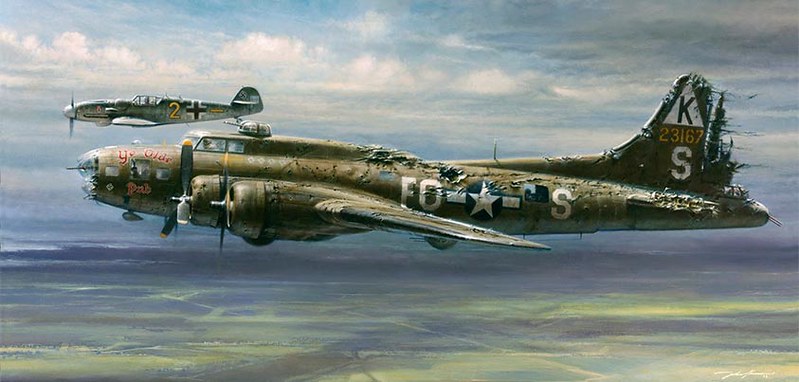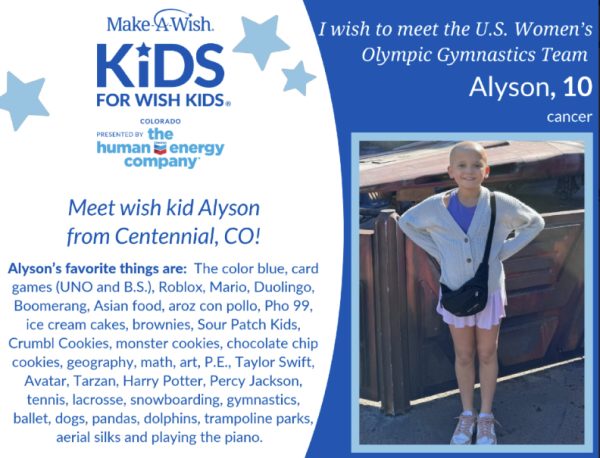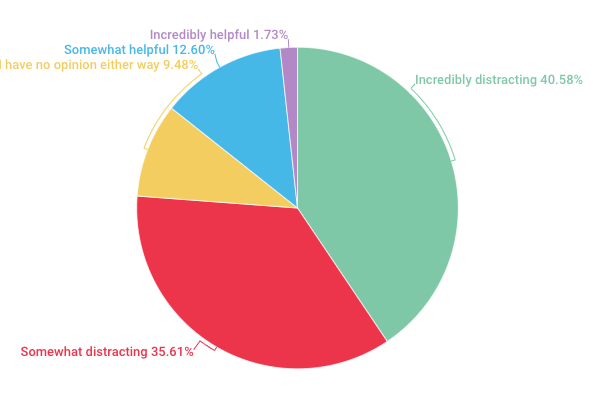Sparing the Enemy
September 19, 2022
December 20, 1943: ‘Ye Old Pub’; an American B-17 bomber flies as part of an eight mile long bomber stream on its way to Northern Germany. Their target was a Focke-Wulf aircraft factory in the city of Bremen.
Shortly after 11:00 in the morning the bombers cross the German border and nervously keep a lookout for enemy fighters. Around 11:30 the bombers are noticed by the soldiers manning German’s anti-air cannons. ‘Ye Old Pub’ is hit and its plexiglass nose and smashes against the windshield. While the men in the bomber are unhurt, icy cold winds rush in bringing the climate of the ship to -60 deegrees celsius (or -76 degrees fahrenheit.) They’re hit three more times, the first takes out the second engine, the second shell rips part way through the left wing before exploding, and the final one damages engine four on the right wing. Charlie Brown; the pilot fights the controls to keep the left wing from ripping off completely. A fifth shell rips off part of the roof around the same time the order to drop the bombs comes through.
With the mission complete the crew of ‘Ye Old Pub’ turns around to head back home. None of the other bombers with ‘Ye Old Pub’ made it through the bombing unscathed; ‘Ye Old Pub’ itself has been reduced to only two functional engines and starts to fall behind along with the bomber besides it. The other plane falls beneath the clouds and a red flash catches Charlie’s eye. The co-pilot sees dark shapes out on the horizon; German fighters.
As the enemy fighters get near, the crew rushes to man the machine guns. Two of the fighters take aim for the cockpit to take out the pilots and the controls at the same time. Charlie, thinking quickly, flies directly at the enemy, giving them little time to hit their target. The fighters take their shots but miss; their bullets bouncing off the top of the plane’s roof. The top gunner takes out one of the fighters. The second is hit by the nose gunner while trying to avoid a collision with the B-17.
More fighters come from behind, and the tail gunner tries to turn his gun to fire at them but nothing happens; the icy air has frozen his guns. The radio operator tries to call for help but only gets static in response. Bullets and shells have ripped through the main body of the plane and the radio was hit by a bullet, many of the crew were wounded in the attack and the tail gunner was killed. Charlie is fighting to keep the remnants of his plane in the air. All the guns but one were left inoperable from the frigid conditions. The fighters make another attack and hit the cockpit, puncturing the pilot’s air supply. Charlie tries to keep control as the plane spirals out of control and then he blacks out.
‘Ye Old Pub’ plunges to the ground of the city of Oldenburg. The abundance of oxygen in the lower altitude wakes Charlie up and he pulls up trying to save the plane from a crash. At just about three thousand feet he manages to get it out of its nose dive flying over the houses of Oldenburg. Most of the crew was left wounded, injured, or both. Only able to fly at a hundred and thirty-five miles per hour, ‘Ye Old Pub’ will have to break through the German line again.
Charlie makes it clear to the crew that any of them can still bail out, after all becoming a prisoner of war is better than being blown to pieces but they all refuse to abandon ship. ‘Ye Old Pub’ flies over Jever airfield, where German fighter ace Franz Stigler is about to start his engine.
A day earlier Franz Stigler had brought down two B-17. Shooting down another one would make him eligible to receive the Knight’s Cross. To Franz though the medal meant more than just an award for being a killing machine; it meant that there is sense behind his fighting and that he has done his duty for his countrymen. He has seen first-hand what the bombers have done to the cities of Hamburg and Bremen, reducing them to rubble, but his fight is not about hatred or revenge, it is about duty and survival. He had learned to fly during his service in the Libyan desert, where he flew with the “Knights of the Desert” and their star fighter ace Hans-Joachim Marseille. He lost a brother to the war and witnessed the destruction of the Afrika Korps, and then was caught up in the desperate fight for Sicily under Adolf Galland. He would earn his Knight’s Cross by shooting down the Flying Fortress that appears now before him.
He began his attack run with his finger resting on the trigger, but he doesn’t shoot. The lack of fire from the enemy plan makes him curious and notices the damage ‘Ye Old Pub’ has taken. He flies closer and pulls up alongside, stunned by the condition of the plane and how it is still able to fly; the only gun that’s left functioning is a ball turret that is unable to aim upwards to harm him. Franz knows that it would only take a few shots to take the plane down but there is little glory in killing unarmed men.
During his time in the Libyan Desert his Commanding Officer had told his squad that if he ever saw or heard about any of them shooting down a man in a parachute he would find them and shoot them himself. In Franz’s eyes the damaged B-17 was the parachute for its defenseless crew.
Charlie’s eyes are locked on the horizons when Franz appears in his view. Franz points downward, signaling to Charlie that he should land the plane, knowing the plane stands a chance against the German Atlantic Wall. Charlie shakes his head in disagreement and Franz knows that everyone in the B-17 is as good as dead if he doesn’t help.
He stays with them flying over German AA and through the Atlantic Wall. As they fly through the sky Charlie can’t understand what the German fighter is doing. It’s not until they pass the Atlantic Wall and Franz salutes him and banks away that Charlie understands what Franz was doing.
‘Ye Old Pub’ makes it back to England, barely, and it is a small miracle that it manages a landing. The commanding officer is about to award them medals for their service, but High Command gets wind of the story and is furious. No one can know. The mission never happened. Everything is swept under the rug. Franz lands in Bremen but can’t tell anyone about what he had done. If anyone knew he would likely be court martialed and then executed.
The story disappeared into the mists of time, but according to the book “A Higher Call” by Adam Makos and Larry Alexander, in 1985, Boeing invited old fighter pilots to the 50th anniversary of the B-17, whose first flights were back in 1935. By then, Franz Stigler was living in Vancouver, Canada. He was in attendance as the only German pilot and was interviewed by a local TV station to which he told his story. That same year, Charlie wrote to the old German flying ace, Adolf Galland, and the German magazine “Jagerblatt” to find out who his German savior was. It took until 1990 until they found each other and met in person after letters and phone calls. Their startling story gained worldwide attention. Even after that, even so long after the war, Franz would receive calls from Germany calling him a traitor, while some Canadian neighbours shunned him as a Nazi. Franz always responded: “They would never understand.”
Eventually Charlie finds Franz and arranges a meeting, the two of them become friends. Franz gave Charlie a book with a note written in it that read, “In 1940, I lost my only brother as a night fighter. On the 20th of December, 4 days before Christmas, I had the chance to save a B-17 from her destruction, a plane so badly damaged, it was a wonder that she was still flying. The pilot, Charlie Brown, is for me as precious as my brother was. Thanks Charlie. Your brother, Franz” The remained lifelong friends until they both died in 2008 a month apart.
Too often when talking about World War II we generalize every German and every German soldier as a Nazi that was cruel and wanted to kill the defenseless and the innocent, but that’s ingoring the fact that the Nazis were a German political party at the time and saying that every German in World War II was a Nazi is no different from saying that every American is a Republican or every American is a Democrat. When talking about a war completely demonizing one side and everyone that fought for them while praising the other will only cause more division and conflict while we should demonize and punish the leaders of the Nazis. We should also be willing to acknowledge the fact that some World War II German soldiers did heroic things, especially when they were saving our own soldiers.
For a song and more info about this event go to: https://www.sabaton.net/discography/heroes/no-bullets-fly/#google_vignette












